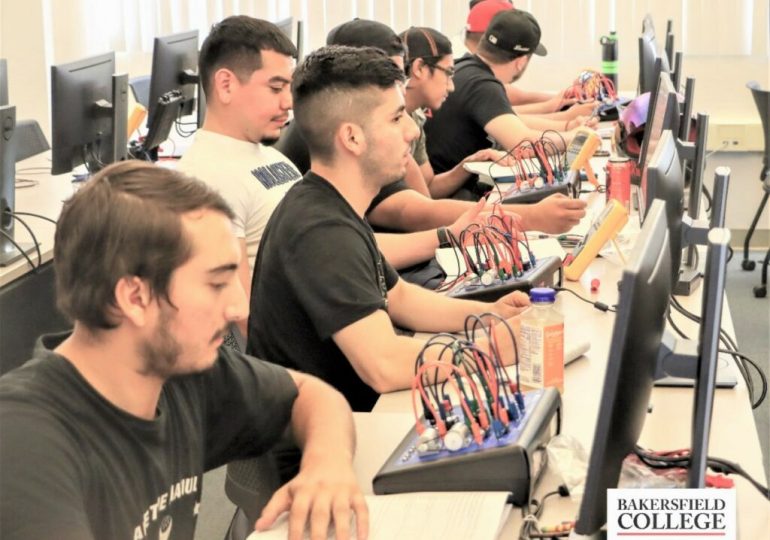Students from Bakersfield College participate in an Intro to EV class.
 Courtesy: Bakersfield College
Courtesy: Bakersfield College
Students from Bakersfield College participate in an Intro to EV class.
I was introduced to community colleges when I left my hometown, Kollam, in southern India, to attend graduate school as a foreign student in California. The idea of open access, that anyone, even older adults, could attend college was astonishing to me.
Now, 30 years later, I’ve been given the opportunity to lead the nation’s largest institution of higher education — the 116-campus, 1.9-million-student California Community College system, where almost half of our students are older adults.
The Community College System is one of our state’s most valuable assets, our main engine of social mobility. We generate $128 billion in annual income for California, amounting to more than 4% of the state’s gross product.
We are essential to the state’s achieving its ambitious goals in everything from climate policy, to growing a world-class labor force, to expanding the middle class. We are essential to the state’s ability to address a massive nursing shortage, support an aging population, prepare for an electric future in need of skilled and trained technicians and more.
None of this can be done without the California Community Colleges.
To fulfill this essential role, we must build on our successes, confront our continuing challenges and accelerate our progress. Our recently released planning document, “Vision 2030: A Roadmap for California Community Colleges,” outlines the steps to take. The plan envisions a higher education system more inclusive of all Californians and one that ensures access points for every learner across race, ethnicity, region, class, age and gender to enter a supported pathway with exit points to transfer or complete a community college baccalaureate or obtain a job with family-sustaining wages.
I am excited that Vision 2030 reexamines what access means when we lead with equity: We can’t wait for individuals to come to college; we must take college to them. We will take college to our high schools and expand dual enrollment, we will take college to our justice-involved Californians, to our foster youth.
We are the largest system of higher education in the nation, yet 6.8 million Californians — disproportionately people of color — have graduated from high school but have no college credentials. This group is likely to be low-income and struggle to find gainful employment. Our roadmap for the coming years addresses this fundamental question: Why has our system not yet reached these individuals? When those in need cannot find their way to college, we must find ways to bring college to them. This means partnering with community-based organizations, worker-represented organizations and industry leaders to implement options that would make college more accessible for these populations, such as short-term courses, workforce-aligned noncredit options, certificates and degrees.
While recently some have questioned the value of college, the evidence is clear: Higher education remains a key to social mobility. We will prioritize skill-building for jobs that pay living wages while recognizing that a baccalaureate degree is a powerful predictor of higher wages.
We will build on our traditional role in workforce training to meet Gov. Gavin Newsom’s priorities for our system in health care, education, STEM and climate change.
In my previous roles heading Bakersfield College and later Kern Community College District, I worked closely with partners to establish a center for renewable energy making the case that community colleges are essential to all aspects of climate work — workforce development, community engagement and large-scale technology transfer for economic development. Our colleges are primed to build the next wave of climate action solutions like the creation of microgrids for grid resilience.
California’s future is inextricably tied to its community colleges. We are committed to partnering together to solve some of California’s toughest challenges, engaging with purpose, creativity, thoughtfulness and urgency. Our time is now!
•••
Sonya Christian is chancellor of California’s 116 community colleges.
The opinions expressed in this commentary represent those of the author. EdSource welcomes commentaries representing diverse points of view. If you would like to submit a commentary, please review our guidelines and contact us.
To get more reports like this one, click here to sign up for EdSource’s no-cost daily email on latest developments in education.
Checkout latest world news below links :
World News || Latest News || U.S. News









